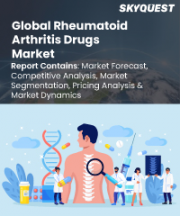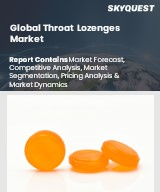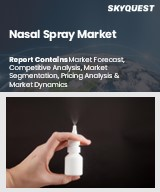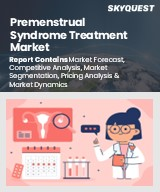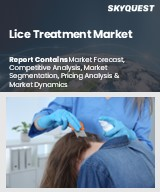
|
시장보고서
상품코드
1510513
오메가 3 처방약 시장 : 산업 규모, 점유율, 동향, 기회, 예측, 약제 유형별, 용도별, 유통 채널별, 지역별, 경쟁별(2019-2029년)Omega 3 Prescription Drugs Market - Global Industry Size, Share, Trends, Opportunity, and Forecast, Segmented By Drug type, By Application, By Distribution Channel, By Region and Competition, 2019-2029F |
||||||
오메가 3 처방약 시장 규모는 2023년에 13억 5,000만 달러, 2029년까지의 예측 기간의 복합 연간 성장률(CAGR)은 8.30%를 나타낼 전망이며 눈부신 성장이 예측되고 있습니다.
| 시장 개요 | |
|---|---|
| 예측 기간 | 2025-2029년 |
| 시장 규모 : 2023년 | 13억 5,000만 달러 |
| 시장 규모 : 2029년 | 21억 6,000만 달러 |
| 복합 연간 성장률(CAGR) : 2024-2029년 | 8.30% |
| 급성장 부문 | 고 트리글리세리드 혈증 부문 |
| 최대 시장 | 북미의 |
오메가 3 처방약은 염증, 심장 건강, 지질 대사와 관련된 다양한 병리에 필수적인 치료제입니다. 이러한 의약품은 다양한 신체 기능을 유지하는 데 필수적인 영양소인 오메가 3 지방산의 장점을 활용합니다. 오메가 3 지방산에는 에이코사펜타엔산(EPA), 도코사헥사엔산(DHA), α - 리놀렌산(ALA)의 3유형가 있습니다. 오메가 3 처방약은 건강을 촉진하는 것으로 인식되고 시장의 성장에 크게 기여하고 있습니다.
일반적으로 상업용 보충제에 비해 고농도 EPA 및 DHA를 포함하는 오메가 3 처방약은 특정 의료 필요에 맞게 조정되며, 종종 의료 전문가의 지도하에 투여됩니다. 그 효능은 심혈관 질환의 심각한 위험 인자인 혈중 트리글리세라이드 농도 증가를 완화시키는 데까지 확장됩니다. 오메가 3 지방산의 주요 성분인 EPA와 DHA는 트리글리세리드 수치를 낮추고 염증을 억제하며 혈관 기능을 향상시켜 심장 건강에 큰 영향을 미칩니다. 이 다면적 접근법은 심장병 발병의 가능성을 감소시키고 예방 심장병학에서 오메가 - 3 처방약의 매우 중요한 역할을 강조합니다.
심혈관계 건강뿐만 아니라 오메가 3 지방산은 항염증 특성을 나타내며 류마티스 관절염, 염증성 장 질환(IBD) 및 기타자가 면역 질환과 같은 증상에 대한 치료 혜택을 제공합니다. 염증 반응을 조절함으로써 오메가 3 처방약은 증상을 완화하고 환자의 삶의 질을 높입니다. 또한 오메가 3 처방약의 가능성은 정신 위생과 우울증과 불안 증상의 완화에도 도움이 되는 것으로 조사에서 시사되고 있습니다.
오메가 3 처방약 시장은 몇 가지 중요한 요인에 힘입어 상당한 성장을 이루고 있습니다. 오메가 3 지방산과 관련된 건강 효과에 대한 의식 증가는 처방약에 대한 소비자 수요를 촉진하고 있습니다. 개인의 건강 의식이 높아짐에 따라 예방 대책과 의학적 상태의 적극적인 관리에 기울여 시장 확대에 박차를 가하고 있습니다.
게다가, 의약품 제형과 약물 전달 기술의 진보는 오메가 3 처방약의 효능과 가용성을 향상시킵니다. 혁신적인 제형은 최적화된 생체이용률과 표적 전달을 가능하게 하며, 부작용을 최소화하면서 최대의 치료 효과를 보장합니다. 이 지속적인 혁신은 소비자의 신뢰를 높이고 시장 성장을 가속합니다.
심혈관 장애 및 염증성 질환과 같은 생활 습관병의 유병률은 세계적으로 상승하는 경향이 있습니다. 건강 관리 시스템이 만성 질환 부담을 다루는 동안 오메가 3 처방약은 이러한 질병을 효과적으로 관리하는 데 필수적인 치료 중재로 부상하고 있습니다. 헬스케어 전문가들은 질병의 예방과 치료에서 오메가 3 지방산의 가치를 점점 인식하게 되어 처방률과 시장 성장의 원동력이 되고 있습니다. 제약 회사와 연구 기관의 전략적 제휴는 오메가 3 처방약의 진보를 촉진하고 있습니다. 이러한 파트너십은 임상시험, 연구조사, 제품개발 이니셔티브를 촉진하고, 의료 제공자나 환자가 이용할 수 있는 치료법의 선택지를 넓히고 있습니다.
낙관적인 시장 전망과는 달리, 규제상의 장애물, 제조 복잡성, 제네릭 제제와의 경쟁과 같은 과제는 여전히 남아 있습니다. 또한, 시장 포화와 가격 압력은 지속적인 성장의 추가 장애가되었습니다. 그러나 현재 진행 중인 조사 노력에 더해 진화하는 규제 프레임워크과 헬스케어 인프라에 대한 투자 증가가 이러한 과제를 완화하고 당면 시장 확대를 지속시킬 것으로 기대됩니다.
시장 성장 촉진요인
건강효과에 대한 의식의 고조가 시장 성장을 견인
심혈관질환률 상승
염증성 질환의 유병률 증가
주요 시장 과제
비용과 저렴한
부작용과 약물 상호작용
환자 규정 준수
주요 시장 동향
맞춤형 의료의 중시의 향상
목차
제1장 개요
제2장 조사 방법
제3장 주요 요약
제4장 COVID - 19가 세계 오메가 3 처방약 시장에 미치는 영향
제5장 고객의 목소리
제6장 세계 오메가3 처방약 시장 전망
- 시장 규모 및 예측
- 금액별
- 시장 규모 및 예측
- 약제 유형별(Vascepa, Lovaza, 기타)
- 용도별(고트리글리세리드혈증, 기타)
- 유통 채널별(병원 약국, 소매 약국, 온라인 약국)
- 지역별
- 기업별(2023)
- 시장 맵
제7장 아시아태평양의 오메가 3 처방약 시장 전망
- 시장 규모 및 예측
- 금액별
- 시장 규모 및 예측
- 약제 유형별
- 용도별
- 유통 채널별
- 국가별
- 아시아태평양 : 국가별 분석
- 중국
- 인도
- 호주
- 일본
- 한국
제8장 유럽의 오메가 3 처방약 시장 전망
- 시장 규모 및 예측
- 금액별
- 시장 규모 및 예측
- 약제 유형별
- 용도별
- 유통 채널별
- 국가별
- 유럽 : 국가별 분석
- 프랑스
- 독일
- 스페인
- 이탈리아
- 영국
제9장 북미의 오메가 3 처방약 시장 전망
- 시장 규모 및 예측
- 금액별
- 시장 규모 및 예측
- 약제 유형별
- 용도별
- 유통 채널별
- 국가별
- 북미 : 국가별 분석
- 미국
- 멕시코
- 캐나다
제10장 남미 오메가 3 처방약 시장 전망
- 시장 규모 및 예측
- 금액별
- 시장 규모 및 예측
- 약제 유형별
- 용도별
- 유통 채널별
- 국가별
- 남미 : 국가별 분석
- 브라질
- 아르헨티나
- 콜롬비아
제11장 중동 및 아프리카 오메가3 처방약 시장 전망
- 시장 규모 및 예측
- 금액별
- 시장 규모 및 예측
- 약제 유형별
- 용도별
- 유통 채널별
- 국가별
- 중동 및 아프리카 : 국가별 분석
- 남아프리카
- 사우디아라비아
- 아랍에미리트(UAE)
제12장 시장 역학
- 성장 촉진요인
- 과제
제13장 시장 동향과 발전
- 최근 동향
- 제품상시
- 합병과 인수
제14장 세계 오메가 3 처방약 시장 : SWOT 분석
제15장 Porter's Five Forces 분석
- 업계 내 경쟁
- 신규 진입의 가능성
- 공급자의 힘
- 고객의 힘
- 대체품의 위협
제16장 PESTEL 분석
제17장 경쟁 구도
- Abbott Laboratories Inc.
- Amarin Pharmaceuticals Ireland Ltd.
- GSK plc(GlaxoSmithKline plc)
- Natrapharm, Inc.(Patriot Pharmaceutical Corp.)
- Viatris, Inc.
- Grupo Ferrer Internacional, SA
- Camber Pharmaceuticals, Inc.
- Dr. Reddy's Laboratories Ltd.
- Zydus Group
- Hikma Pharmaceuticals PLC
제18장 전략적 제안
제19장 기업 소개와 면책사항
BJH 24.07.18Global Omega 3 Prescription Drugs Market valued at USD 1.35 billion in 2023 and is anticipated to project impressive growth in the forecast period with a CAGR of 8.30% through 2029.
| Market Overview | |
|---|---|
| Forecast Period | 2025-2029 |
| Market Size 2023 | USD 1.35 Billion |
| Market Size 2029 | USD 2.16 Billion |
| CAGR 2024-2029 | 8. 30% |
| Fastest Growing Segment | Hypertriglyceridemia Segment |
| Largest Market | North America |
Omega-3 Prescription Drugs serve as essential treatments for various medical conditions linked to inflammation, heart health, and lipid metabolism. These drugs harness the benefits of omega-3 fatty acids, crucial nutrients vital for sustaining diverse bodily functions. Omega-3 fatty acids comprise three primary type such as eicosapentaenoic acid (EPA), docosahexaenoic acid (DHA), and alpha-linolenic acid (ALA). Their increased recognition for fostering health has positioned Omega-3 Prescription Drugs as influential contributors to the global market's growth trajectory.
Typically containing higher concentrations of EPA and DHA compared to over-the-counter supplements, Omega-3 prescription drugs are tailored for specific medical needs, often administered under healthcare professional guidance. Their efficacy extends to mitigating elevated triglyceride levels in the bloodstream, a significant risk factor for cardiovascular diseases. EPA and DHA, prominent constituents of Omega-3 fatty acids, demonstrate considerable benefits for heart health by diminishing triglyceride levels, curbing inflammation, and enhancing blood vessel functionality. This multifaceted approach reduces the likelihood of heart disease development, highlighting the pivotal role of Omega-3 prescription drugs in preventive cardiology.
Beyond cardiovascular health, Omega-3 fatty acids exhibit anti-inflammatory properties that offer therapeutic advantages for conditions such as rheumatoid arthritis, inflammatory bowel disease (IBD), and other autoimmune disorders. By modulating inflammatory responses, Omega-3 prescription drugs alleviate symptoms and enhance patients' quality of life. Moreover, their potential extends to mental health, with research suggesting benefits in alleviating symptoms of depression and anxiety.
The global market for Omega-3 Prescription Drugs is witnessing significant growth, propelled by several key factors. Heightened awareness of the health benefits associated with omega-3 fatty acids is driving consumer demand for these prescription drugs. As individuals become increasingly health-conscious, they are inclined towards preventive measures and proactive management of medical conditions, fueling market expansion.
Moreover, advancements in pharmaceutical formulations and drug delivery technologies are enhancing the efficacy and accessibility of Omega-3 Prescription Drugs. Innovative formulations enable optimized bioavailability and targeted delivery, ensuring maximum therapeutic impact while minimizing adverse effects. This continuous innovation bolsters consumer confidence and fosters market growth.
The prevalence of lifestyle-related diseases, such as cardiovascular disorders and inflammatory conditions, is on the rise globally. As healthcare systems grapple with the burden of chronic diseases, Omega-3 Prescription Drugs emerge as indispensable therapeutic interventions for managing these conditions effectively. Healthcare professionals increasingly recognize the value of omega-3 fatty acids in disease prevention and treatment, driving prescription rates and market growth. Strategic collaborations between pharmaceutical companies and research institutions are fostering advancements in Omega-3 Prescription Drugs. These partnerships facilitate clinical trials, research studies, and product development initiatives, enriching the therapeutic armamentarium available to healthcare providers and patients.
Despite the optimistic market outlook, challenges such as regulatory hurdles, manufacturing complexities, and competition from generic formulations persist. Moreover, market saturation and pricing pressures pose additional obstacles to sustained growth. However, ongoing research efforts, coupled with evolving regulatory frameworks and increasing investment in healthcare infrastructure, are expected to mitigate these challenges and sustain market expansion in the foreseeable future.
Key Market Drivers
Growing Awareness Of Health Benefits Drives The Market Growth
The growing awareness of the health benefits of omega-3 fatty acids is a significant driver of the growth of the global Omega 3 prescription drugs market. This awareness has led to increased consumer interest in and demand for omega-3 products, including prescription drugs. As consumers become more informed about the potential health benefits of omega-3 fatty acids, they actively seek out products that contain these essential nutrients. This includes prescription drugs that offer higher concentrations of omega-3s for targeted health benefits. Media outlets, health blogs, social media platforms, and health professionals share information about the positive effects of omega-3 fatty acids on various aspects of health. This dissemination of information helps educate the public and creates a buzz around omega-3 supplements, including prescription options.
The growing global emphasis on health and wellness has led individuals to take a proactive approach to their well-being. As a result, they are more likely to explore supplements and prescription medications that offer potential health benefits, including omega-3 prescription drugs. The availability of online resources makes it easier for consumers to research health topics, including the benefits of omega-3s. This information empowers them to discuss omega-3 supplements with their healthcare providers and inquire about prescription options. Consumer awareness also extends to healthcare providers. Patients who are aware of the benefits of omega-3s are more likely to discuss these options with their doctors. As a result, healthcare professionals may recommend prescription omega-3 drugs when appropriate, driving further demand.
Rising Cardiovascular Disease Rates
Rising cardiovascular disease rates play a significant role in driving the growth of the global Omega 3 prescription drugs market. Cardiovascular diseases (CVDs), such as heart disease and stroke, are a leading cause of death and morbidity worldwide. Omega-3 prescription drugs are considered beneficial in managing certain risk factors associated with cardiovascular diseases. Cardiovascular diseases are often linked to risk factors such as high triglyceride levels, high blood pressure, and inflammation. Omega-3 fatty acids, particularly EPA and DHA, have been shown to have positive effects on these risk factors. As cardiovascular disease rates rise, there is an increased demand for interventions that can help manage these risk factors. Healthcare professionals are more likely to recommend omega-3 prescription drugs to patients with cardiovascular disease risk factors. As the prevalence of CVDs increases, more individuals are being advised by their doctors to incorporate these prescription drugs as part of their treatment plans.
With the growing awareness of the importance of preventive healthcare, individuals are seeking ways to lower their risk of developing cardiovascular diseases. Omega-3 prescription drugs are positioned as a preventative measure that can help lower the risk of heart disease and related conditions. As the global population ages, the risk of developing cardiovascular diseases tends to increase. Older adults are more susceptible to heart-related issues. Omega-3 prescription drugs are often considered in the management of heart health for this demographic, driving demand. For individuals who have already experienced cardiovascular events, such as heart attacks, omega-3 prescription drugs can be part of secondary prevention strategies. These drugs can help reduce the likelihood of recurrent events, and their use is likely to increase as more people experience initial cardiovascular events.
Increasing Prevalence of Inflammatory Conditions
The increasing prevalence of inflammatory conditions is a significant driver of the growth of the global Omega 3 prescription drugs market. Inflammatory conditions, such as rheumatoid arthritis, inflammatory bowel disease (IBD), and autoimmune disorders, often involve chronic inflammation that can lead to discomfort, pain, and long-term health complications. Omega-3 fatty acids have been recognized for their anti-inflammatory properties, and this has led to their consideration as potential therapeutic options for managing inflammatory conditions. Omega-3 fatty acids, especially EPA and DHA, have been shown to have anti-inflammatory effects. They can modulate the production of inflammatory molecules in the body, potentially reducing the severity of symptoms in inflammatory conditions.
Complementary Treatment: Omega-3 prescription drugs are often used as complementary treatments alongside conventional therapies for inflammatory conditions. Healthcare providers may recommend them to patients as part of a comprehensive approach to managing inflammation and improving overall quality of life. Inflammatory conditions are often associated with pain and discomfort. Omega-3 fatty acids' anti-inflammatory effects can contribute to pain relief, which is a crucial factor in patients' well-being. This pain-relieving aspect can drive demand for prescription omega-3 drugs. As individuals with inflammatory conditions seek ways to alleviate their symptoms and improve their quality of life, they may actively inquire about potential treatments, including omega-3 prescription drugs, with their healthcare providers. Healthcare professionals, including rheumatologists and gastroenterologists, are likely to recommend prescription omega-3 drugs to patients with inflammatory conditions. Positive clinical outcomes and research findings can reinforce these recommendations.
Key Market Challenges
Costs and Affordability
Costs and affordability pose a significant challenge for the Global Omega 3 Prescription Drugs market, impacting both patients and healthcare systems. Omega 3 prescription drugs, like many other prescription medications, can be expensive to produce and market. The costs associated with research, development, clinical trials, regulatory compliance, and marketing can contribute to higher prices.
Some insurance plans may not fully cover the cost of omega 3 prescription drugs, leaving patients to shoulder a substantial portion of the expense. This can deter individuals from seeking or continuing necessary treatment due to financial constraints.
Even when insurance coverage is available, co-payments, deductibles, and other out-of-pocket expenses can add up, making prescription omega-3 drugs unaffordable for certain patients. Many health benefits of omega-3 prescription drugs are best achieved through consistent long-term use. The ongoing nature of treatment can lead to cumulative costs that patients may find difficult to manage. High costs can lead some patients to skip doses or discontinue treatment prematurely, compromising the effectiveness of the medication and potentially leading to poorer health outcomes, ultimately impacting market growth in the forecast period.
Side Effects and Drug Interactions
Side effects and drug interactions are significant challenges that can impact the Global Omega 3 prescription drugs market. While omega-3 fatty acids are generally considered safe and well-tolerated, they can still cause adverse effects and interact with other medications. Some individuals may experience gastrointestinal symptoms such as nausea, diarrhoea, or indigestion when taking omega-3 prescription drugs, particularly at higher doses. Omega-3 fatty acids have mild antiplatelet effects that can increase the risk of bleeding, especially when taken in combination with other blood-thinning medications like aspirin or anticoagulants. While rare, some individuals may be allergic to components in omega-3 supplements, leading to allergic reactions.
Omega-3 fatty acids can interact with blood-thinning medications, potentially increasing the risk of bleeding. This can be a concern for individuals taking medications like warfarin or aspirin. Omega-3 fatty acids may have immuno-modulatory effects, which could potentially interfere with the effectiveness of immunosuppressive medications used in autoimmune diseases or organ transplant patients. Omega-3 supplements might affect blood sugar levels and interact with diabetes medications, potentially altering glycaemic control.
Patient Compliance
Patient compliance, also known as medication adherence, is a significant challenge for the Global Omega 3 prescription drugs market. It refers to the extent to which patients follow the recommended treatment regimen, including taking medications as prescribed. In the context of omega-3 prescription drugs, ensuring consistent and long-term use is crucial to achieving the desired health outcomes. Many of the health benefits associated with omega-3 fatty acids require sustained use over an extended period. Patients may struggle with maintaining adherence to a treatment regimen that requires ongoing commitment.
Omega-3 prescription drugs are often used for preventive purposes or to manage conditions with subtle or asymptomatic symptoms. In these cases, patients may not feel an immediate improvement, leading to decreased motivation to continue taking the medication. Some patients may be prescribed multiple medications with different dosing schedules. Adding omega-3 prescription drugs to an already complex regimen can increase the likelihood of non-compliance. In the busy lives of patients, it's easy to forget to take medications on time. This can lead to inconsistent dosing and decreased efficacy of omega-3 drugs.
Key Market Trends
Increasing Emphasis on Personalized Medicine
The trend of increasing emphasis on personalized medicine is influencing the Global Omega 3 prescription drugs market in several ways. Personalized medicine involves tailoring medical treatment and interventions to individual patient characteristics, such as genetics, medical history, lifestyle, and preferences. In the context of omega-3 prescription drugs, this trend is shaping the way these medications are prescribed, administered, and integrated into patients' overall healthcare plans. Healthcare providers are increasingly considering patients' unique health profiles when prescribing omega-3 prescription drugs. Factors such as the patient's specific health conditions, genetic makeup, existing medications, and dietary habits are considered to develop treatment plans that are tailored to their needs.
Instead of a one-size-fits-all approach, omega-3 prescription drugs are being prescribed to address specific health conditions where they have the most potential benefit. For instance, patients with high triglyceride levels may receive omega-3 prescriptions primarily to manage cardiovascular risk.
Personalized medicine allows for optimizing the dosage and formulation of omega-3 prescription drugs based on individual patient factors. This ensures that patients receive the most effective dose while minimizing the risk of side effects. Omega-3 prescription drugs are being used as part of a personalized approach to assess an individual's risk of certain health conditions, such as cardiovascular disease. Patients at higher risk may receive omega-3 prescriptions as preventive measures. In personalized treatment plans, omega-3 prescription drugs are often integrated into combination therapies alongside other medications or interventions. This approach aims to enhance overall treatment effectiveness by targeting multiple aspects of a patient's health.
Segmental Insights
Application Insight
Based on the category of Application, the hypertriglyceridemia application segment emerged as the dominant application in the global market for Omega 3 Prescription Drugs in 2023. The application of omega-3 prescription drugs in treating hypertriglyceridemia has been a significant segment in the Global Omega 3 prescription drugs market. Hypertriglyceridemia is a medical condition characterized by abnormally high levels of triglycerides in the blood. Omega-3 prescription drugs, such as Vascepa (icosapent ethyl), have been approved for the treatment of this condition. Omega-3 prescription drugs, like Vascepa, have gained regulatory approval specifically for the treatment of hypertriglyceridemia. This targeted indication positions these drugs as specialized treatments for addressing a well-defined medical condition.
Clinical trials and research have demonstrated the effectiveness of omega-3 prescription drugs, especially Vascepa, in reducing triglyceride levels in patients with hypertriglyceridemia. Positive outcomes from these studies contribute to the credibility of omega-3 drugs as a treatment option. Healthcare providers often prescribe omega-3 prescription drugs to patients with hypertriglyceridemia as part of their treatment plans. The availability of prescription medications tailored for this condition encourages physician recommendations. Pharmaceutical companies and healthcare organizations have conducted awareness and education campaigns to inform healthcare professionals and patients about the link between hypertriglyceridemia and cardiovascular risk, as well as the potential benefits of omega-3 drugs in managing this condition.
Distribution Channel Insights
The retail pharmacy distribution channel segment is projected to experience rapid growth during the forecast period. A licensed healthcare provider, such as a physician, nurse practitioner, or physician assistant, evaluates the patient's medical condition and prescribes the appropriate medication if deemed necessary. The prescription is sent to a pharmacy, either a community pharmacy or a hospital pharmacy, where trained pharmacists review the prescription, dispense the medication, and provide patient counselling.
The patient visits the pharmacy to pick up the prescribed medication. Pharmacists may provide additional information about the medication's usage, potential side effects, and interactions. For prescribed medications, insurance coverage may apply, and the patient may need to pay a co-payment or other out-of-pocket costs as per their insurance plan. Prescription medications are subject to strict regulatory oversight to ensure patient safety, proper dispensing, and appropriate use. These factors collectively contribute to the growth of this segment.
Regional Insights
North America emerged as the dominant region in the global Omega 3 Prescription Drugs market in 2023, holding the largest market share in terms of value. In 2021, North America accounted for more than 60% of global revenue and is projected to grow at a CAGR of more than 7%. According to the Center for Disease Control and Prevention (CDC), heart-related diseases in the United States are the leading killer of both men and women, as well as members of most racial and ethnic communities. In the United States, one person dies of cardiovascular disease every 36 seconds. The region's growing awareness of heart-related diseases is fuelling the product demand. High triglyceride levels are linked to obesity, with two out of every three U.S. adults (69%) being obese or overweight, and one in three (36%) being overweight.
Asia Pacific is projected to grow at the highest CAGR over the forecast period Diabetes mellitus has been on the rise in recent years and has become a major health concern among the Asian population One of the most serious side effects of diabetes and the leading cause of death among diabetic patients is cardiovascular disease (CVD). High LDL-cholesterol levels are a major risk factor for cardiovascular disease. Lower triglyceride levels are a growing concern among the population.
Key Market Players
Abbott Laboratories Inc
Amarin Pharmaceuticals Ireland Ltd.
GSK plc (GlaxoSmithKline plc)
Natrapharm, Inc. (Patriot Pharmaceutical Corp.)
Viatris, Inc.
Grupo Ferrer Internacional, S.A.
Camber Pharmaceuticals, Inc.
Dr. Reddy's Laboratories Ltd.
Zydus Group
Hikma Pharmaceuticals PLC
Report Scope:
In this report, the Global Omega 3 Prescription Drugs Market has been segmented into the following categories, in addition to the industry trends which have also been detailed below:
Omega 3 Prescription Drugs Market, By Drug Type:
-
Vascepa
Lovaza
Others
Omega 3 Prescription Drugs Market, By Application:
-
Hypertriglyceridemia
Others
Omega 3 Prescription Drugs Market, By Distribution Channel:
-
Hospital Pharmacy
Retail Pharmacy
Online Pharmacy
Omega 3 Prescription Drugs Market, By Region:
-
North America
- United States
- Canada
- Mexico
- France
- United Kingdom
- Italy
- Germany
- Spain
- China
- India
- Japan
- Australia
- South Korea
- Brazil
- Argentina
- Colombia
- South Africa
- Saudi Arabia
- UAE
Competitive Landscape
Company Profiles: Detailed analysis of the major companies present in the Global Omega 3 Prescription Drugs Market.
Available Customizations:
Global Omega 3 Prescription Drugs market report with the given market data, TechSci Research offers customizations according to a company's specific needs. The following customization options are available for the report:
Company Information
Detailed analysis and profiling of additional market players (up to five).
Table of Contents
1. Product Overview
- 1.1. Market Definition
- 1.2. Scope of the Market
- 1.2.1. Markets Covered
- 1.2.2. Years Considered for Study
- 1.2.3. Key Market Segmentations
2. Research Methodology
- 2.1. Objective of the Study
- 2.2. Baseline Methodology
- 2.3. Key Industry Partners
- 2.4. Major Association and Secondary Sources
- 2.5. Forecasting Methodology
- 2.6. Data Triangulation & Validation
- 2.7. Assumptions and Limitations
3. Executive Summary
- 3.1. Overview of the Market
- 3.2. Overview of Key Market Segmentations
- 3.3. Overview of Key Market Players
- 3.4. Overview of Key Regions/Countries
- 3.5. Overview of Market Drivers, Challenges, Trends
4. Impact of COVID-19 on Global Omega 3 Prescription Drugs Market
5. Voice of Customer
6. Global Omega 3 Prescription Drugs Market Outlook
- 6.1. Market Size & Forecast
- 6.1.1. By Value
- 6.2. Market Share & Forecast
- 6.2.1. By Drug Type (Vascepa, Lovaza, Others)
- 6.2.2. By Application (Hypertriglyceridemia, Others)
- 6.2.3. By Distribution Channel (Hospital Pharmacy, Retail Pharmacy, Online Pharmacy)
- 6.2.4. By Region
- 6.2.5. By Company (2023)
- 6.3. Market Map
7. Asia Pacific Omega 3 Prescription Drugs Market Outlook
- 7.1. Market Size & Forecast
- 7.1.1. By Value
- 7.2. Market Share & Forecast
- 7.2.1. By Drug Type
- 7.2.2. By Application
- 7.2.3. By Distribution Channel
- 7.2.4. By Country
- 7.3. Asia Pacific: Country Analysis
- 7.3.1. China Omega 3 Prescription Drugs Market Outlook
- 7.3.1.1. Market Size & Forecast
- 7.3.1.1.1. By Value
- 7.3.1.2. Market Share & Forecast
- 7.3.1.2.1. By Drug Type
- 7.3.1.2.2. By Application
- 7.3.1.2.3. By Distribution Channel
- 7.3.1.1. Market Size & Forecast
- 7.3.2. India Omega 3 Prescription Drugs Market Outlook
- 7.3.2.1. Market Size & Forecast
- 7.3.2.1.1. By Value
- 7.3.2.2. Market Share & Forecast
- 7.3.2.2.1. By Drug Type
- 7.3.2.2.2. By Application
- 7.3.2.2.3. By Distribution Channel
- 7.3.2.1. Market Size & Forecast
- 7.3.3. Australia Omega 3 Prescription Drugs Market Outlook
- 7.3.3.1. Market Size & Forecast
- 7.3.3.1.1. By Value
- 7.3.3.2. Market Share & Forecast
- 7.3.3.2.1. By Drug Type
- 7.3.3.2.2. By Application
- 7.3.3.2.3. By Distribution Channel
- 7.3.3.1. Market Size & Forecast
- 7.3.4. Japan Omega 3 Prescription Drugs Market Outlook
- 7.3.4.1. Market Size & Forecast
- 7.3.4.1.1. By Value
- 7.3.4.2. Market Share & Forecast
- 7.3.4.2.1. By Drug Type
- 7.3.4.2.2. By Application
- 7.3.4.2.3. By Distribution Channel
- 7.3.4.1. Market Size & Forecast
- 7.3.5. South Korea Omega 3 Prescription Drugs Market Outlook
- 7.3.5.1. Market Size & Forecast
- 7.3.5.1.1. By Value
- 7.3.5.2. Market Share & Forecast
- 7.3.5.2.1. By Drug Type
- 7.3.5.2.2. By Application
- 7.3.5.2.3. By Distribution Channel
- 7.3.5.1. Market Size & Forecast
- 7.3.1. China Omega 3 Prescription Drugs Market Outlook
8. Europe Omega 3 Prescription Drugs Market Outlook
- 8.1. Market Size & Forecast
- 8.1.1. By Value
- 8.2. Market Share & Forecast
- 8.2.1. By Drug Type
- 8.2.2. By Application
- 8.2.3. By Distribution Channel
- 8.2.4. By Country
- 8.3. Europe: Country Analysis
- 8.3.1. France Omega 3 Prescription Drugs Market Outlook
- 8.3.1.1. Market Size & Forecast
- 8.3.1.1.1. By Value
- 8.3.1.2. Market Share & Forecast
- 8.3.1.2.1. By Drug Type
- 8.3.1.2.2. By Application
- 8.3.1.2.3. By Distribution Channel
- 8.3.1.1. Market Size & Forecast
- 8.3.2. Germany Omega 3 Prescription Drugs Market Outlook
- 8.3.2.1. Market Size & Forecast
- 8.3.2.1.1. By Value
- 8.3.2.2. Market Share & Forecast
- 8.3.2.2.1. By Drug Type
- 8.3.2.2.2. By Application
- 8.3.2.2.3. By Distribution Channel
- 8.3.2.1. Market Size & Forecast
- 8.3.3. Spain Omega 3 Prescription Drugs Market Outlook
- 8.3.3.1. Market Size & Forecast
- 8.3.3.1.1. By Value
- 8.3.3.2. Market Share & Forecast
- 8.3.3.2.1. By Drug Type
- 8.3.3.2.2. By Application
- 8.3.3.2.3. By Distribution Channel
- 8.3.3.1. Market Size & Forecast
- 8.3.4. Italy Omega 3 Prescription Drugs Market Outlook
- 8.3.4.1. Market Size & Forecast
- 8.3.4.1.1. By Value
- 8.3.4.2. Market Share & Forecast
- 8.3.4.2.1. By Drug Type
- 8.3.4.2.2. By Application
- 8.3.4.2.3. By Distribution Channel
- 8.3.4.1. Market Size & Forecast
- 8.3.5. United Kingdom Omega 3 Prescription Drugs Market Outlook
- 8.3.5.1. Market Size & Forecast
- 8.3.5.1.1. By Value
- 8.3.5.2. Market Share & Forecast
- 8.3.5.2.1. By Drug Type
- 8.3.5.2.2. By Application
- 8.3.5.2.3. By Distribution Channel
- 8.3.5.1. Market Size & Forecast
- 8.3.1. France Omega 3 Prescription Drugs Market Outlook
9. North America Omega 3 Prescription Drugs Market Outlook
- 9.1. Market Size & Forecast
- 9.1.1. By Value
- 9.2. Market Share & Forecast
- 9.2.1. By Drug Type
- 9.2.2. By Application
- 9.2.3. By Distribution Channel
- 9.2.4. By Country
- 9.3. North America: Country Analysis
- 9.3.1. United States Omega 3 Prescription Drugs Market Outlook
- 9.3.1.1. Market Size & Forecast
- 9.3.1.1.1. By Value
- 9.3.1.2. Market Share & Forecast
- 9.3.1.2.1. By Drug Type
- 9.3.1.2.2. By Application
- 9.3.1.2.3. By Distribution Channel
- 9.3.1.1. Market Size & Forecast
- 9.3.2. Mexico Omega 3 Prescription Drugs Market Outlook
- 9.3.2.1. Market Size & Forecast
- 9.3.2.1.1. By Value
- 9.3.2.2. Market Share & Forecast
- 9.3.2.2.1. By Drug Type
- 9.3.2.2.2. By Application
- 9.3.2.2.3. By Distribution Channel
- 9.3.2.1. Market Size & Forecast
- 9.3.3. Canada Omega 3 Prescription Drugs Market Outlook
- 9.3.3.1. Market Size & Forecast
- 9.3.3.1.1. By Value
- 9.3.3.2. Market Share & Forecast
- 9.3.3.2.1. By Drug Type
- 9.3.3.2.2. By Application
- 9.3.3.2.3. By Distribution Channel
- 9.3.3.1. Market Size & Forecast
- 9.3.1. United States Omega 3 Prescription Drugs Market Outlook
10. South America Omega 3 Prescription Drugs Market Outlook
- 10.1. Market Size & Forecast
- 10.1.1. By Value
- 10.2. Market Share & Forecast
- 10.2.1. By Drug Type
- 10.2.2. By Application
- 10.2.3. By Distribution Channel
- 10.2.4. By Country
- 10.3. South America: Country Analysis
- 10.3.1. Brazil Omega 3 Prescription Drugs Market Outlook
- 10.3.1.1. Market Size & Forecast
- 10.3.1.1.1. By Value
- 10.3.1.2. Market Share & Forecast
- 10.3.1.2.1. By Drug Type
- 10.3.1.2.2. By Application
- 10.3.1.2.3. By Distribution Channel
- 10.3.1.1. Market Size & Forecast
- 10.3.2. Argentina Omega 3 Prescription Drugs Market Outlook
- 10.3.2.1. Market Size & Forecast
- 10.3.2.1.1. By Value
- 10.3.2.2. Market Share & Forecast
- 10.3.2.2.1. By Drug Type
- 10.3.2.2.2. By Application
- 10.3.2.2.3. By Distribution Channel
- 10.3.2.1. Market Size & Forecast
- 10.3.3. Colombia Omega 3 Prescription Drugs Market Outlook
- 10.3.3.1. Market Size & Forecast
- 10.3.3.1.1. By Value
- 10.3.3.2. Market Share & Forecast
- 10.3.3.2.1. By Drug Type
- 10.3.3.2.2. By Application
- 10.3.3.2.3. By Distribution Channel
- 10.3.3.1. Market Size & Forecast
- 10.3.1. Brazil Omega 3 Prescription Drugs Market Outlook
11. Middle East and Africa Omega 3 Prescription Drugs Market Outlook
- 11.1. Market Size & Forecast
- 11.1.1. By Value
- 11.2. Market Share & Forecast
- 11.2.1. By Drug Type
- 11.2.2. By Application
- 11.2.3. By Distribution Channel
- 11.2.4. By Country
- 11.3. MEA: Country Analysis
- 11.3.1. South Africa Omega 3 Prescription Drugs Market Outlook
- 11.3.1.1. Market Size & Forecast
- 11.3.1.1.1. By Value
- 11.3.1.2. Market Share & Forecast
- 11.3.1.2.1. By Drug Type
- 11.3.1.2.2. By Application
- 11.3.1.2.3. By Distribution Channel
- 11.3.1.1. Market Size & Forecast
- 11.3.2. Saudi Arabia Omega 3 Prescription Drugs Market Outlook
- 11.3.2.1. Market Size & Forecast
- 11.3.2.1.1. By Value
- 11.3.2.2. Market Share & Forecast
- 11.3.2.2.1. By Drug Type
- 11.3.2.2.2. By Application
- 11.3.2.2.3. By Distribution Channel
- 11.3.2.1. Market Size & Forecast
- 11.3.3. UAE Omega 3 Prescription Drugs Market Outlook
- 11.3.3.1. Market Size & Forecast
- 11.3.3.1.1. By Value
- 11.3.3.2. Market Share & Forecast
- 11.3.3.2.1. By Drug Type
- 11.3.3.2.2. By Application
- 11.3.3.2.3. By Distribution Channel
- 11.3.3.1. Market Size & Forecast
- 11.3.1. South Africa Omega 3 Prescription Drugs Market Outlook
12. Market Dynamics
- 12.1. Drivers
- 12.2. Challenges
13. Market Trends & Developments
- 13.1. Recent Developments
- 13.2. Product Launches
- 13.3. Mergers & Acquisitions
14. Global Omega 3 Prescription Drugs Market: SWOT Analysis
15. Porter's Five Forces Analysis
- 15.1. Competition in the Industry
- 15.2. Potential of New Entrants
- 15.3. Power of Suppliers
- 15.4. Power of Customers
- 15.5. Threat of Substitute Product
16. PESTLE Analysis
17. Competitive Landscape
- 17.1. Abbott Laboratories Inc.
- 17.1.1. Business Overview
- 17.1.2. Company Snapshot
- 17.1.3. Products & Services
- 17.1.4. Financials (In case of listed companies)
- 17.1.5. Recent Developments
- 17.1.6. SWOT Analysis
- 17.2. Amarin Pharmaceuticals Ireland Ltd.
- 17.3. GSK plc (GlaxoSmithKline plc)
- 17.4. Natrapharm, Inc. (Patriot Pharmaceutical Corp.)
- 17.5. Viatris, Inc.
- 17.6. Grupo Ferrer Internacional, S.A.
- 17.7. Camber Pharmaceuticals, Inc.
- 17.8. Dr. Reddy's Laboratories Ltd.
- 17.9. Zydus Group
- 17.10. Hikma Pharmaceuticals PLC
18. Strategic Recommendations
19. About Us & Disclaimer
(주말 및 공휴일 제외)










